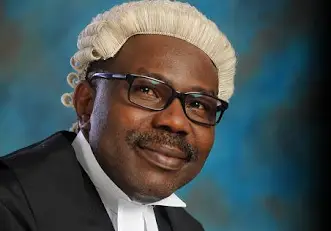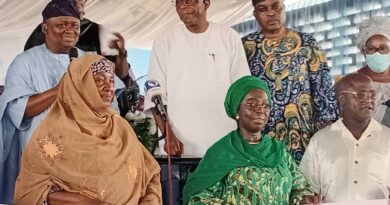Removal of Lagos State House of Assembly Speaker: Matters arising – Dr. Muiz Banire
As the new year commences, every human being had wished himself a happy year, so also is Honourable Mudashiru Obasa. With the unfolding development at the Lagos State House of Assembly. However, one is not too sure that the supplication of Mudasiru Obasa in this regard had been answered. Up till the 12th of January, 2025, barely two weeks into the year, Mudasiru Obasa was the Speaker of the Lagos State House of Assembly. By the next day, however, 13th January 2025, he had suddenly become one-time Speaker of the Lagos State House of Assembly.
This was consequent upon his removal in what seemed to be a coup. This event is certainly not new to the Lagos State House of Assembly as at a point in time, we had witnessed the removal of also a sitting Speaker in the names of Hon. Jokotola Pelumi. As at the time of his removal, nothing concrete in my view was the allegation. As a member of the cabinet then, I can unequivocally state that not so much fund was accessible to the House unlike now.
Generally, there was real austerity in that period. Hence, misappropriation was virtually impossible as there was nothing really to misappropriate, and in fact, not so much fashionable then. In a fashion nearly identical to the removal of Pelumi, Hon. Funmi Tejuoso, then as Deputy Speaker was removed for an event totally unconnected with her and while out of the country. As an active participant in the politics and governance of Lagos State then, I know that in the two instances above, it was the inordinate ambition of some members of the House and the tendency to control, that led to the plot of removal.
The latest is the removal of Mudashiru Obasa for so many reasons advanced by his colleagues, ranging from high-handedness, fraud, gross misconduct etc. Although, I have not directly seen any publication or statement by the removed Speaker in rebuttal of the allegations, a certain faceless human rights group had however condemned the removal and vowed to contest same on the ground of breach of fair hearing.
By way of anecdote, Mudasiru Obasa was highly active and instrumental to the removal of all the above victims. It was the same high-handedness he applied in the removal of Lanre Osun, Muyiwa Jimoh and others. In fact, their offices were locked while they were barred from even accessing the premises of the House. As the proverb goes, whoever kills by sword, must surely expect to die by the sword.
His removal from office as a Speaker must therefore not be a surprise to him. It is the bitter bills that he was used to administering to others that he now partook in. As such, now that it is his turn to enjoy the same pills, he must heartily enjoy the same. Now to the real matters arising from the removal of Mudasiru Obasa. As I indicated above, I have not seen or read any statement from Mudasiru Obasa, but I have read a counter-offensive from a faceless human rights group condemning the removal and challenging the basis of his removal.
Ordinarily, I ought not to dignify the statements with any comment but for the fact they raised a pertinent issue of the basis of the removal and the question of fair hearing. It is the contention of the group that since allegations were made against the removed Speaker, he ought to be availed the opportunity of defending himself before removal. Brilliant submission, I dare say!
However, our primary enquiry must be whether reasons are required for the removal of the Speaker, and by extension, principal officers of the House. To answer this, I think the question might simply be asked as to the basis of eligibility for election as a Speaker, or other principal officers. To the best of my knowledge, I am not aware of any legal requirement beyond election into the House to qualify for election as a Speaker, or any other principal officer. I am not oblivious of the fact that in some Rules of the House, the requirement of ranking is often introduced.
That can only last to the extent that the pre-requisite is not challenged by any member of the House. In other words, members only come together to elect whosoever they believe will best serve their interests as legislators. This is basically by way of social contract. This implies that the collective wish of the majority of the members determines the ascendancy to speakership, or any other principal officer’s position.
If this is the situation as I know it, then, the members of the House need not advance any reason for the removal of their leaders. Once they find the Speaker, or any other principal officer unworthy of leading them, they are at liberty to remove such officer. The import of the above is that the members of the House need not advance any reason for the removal of the Speaker, or any other principal members. It suffices to simply state that we do not want such person or officer to lead us again.
Where the principal officer fails, neglects and/or refuses to discharge effectively this role under the social contract, he has earned his removal. However, where the members chose to advance reasons for the removal of the Speaker, or any other principal on grounds of allegations, particularly criminal, they automatically put themselves under the burden of compliance with fair hearing. What this means is that the affected officer must be availed the opportunity of defending himself under the principle of fair hearing. This much was the contention of the group. I therefore ask if the removal was tied to any allegation whatsoever? I doubt that much. The answer to the inquisition can best be found in the Hansard of the House as opposed to individual public utterances of the members. That cannot ground the infraction of fair hearing. In as much as one would have wanted to be sympathetic towards the removed Speaker in this regard, I make bold to say that he was part of the collaborators in the establishment and perpetration of injustice. While in all good conscience, I will tend to agree with the agitators that where allegations are made against the Speaker, particularly criminal, he ought to be availed the opportunity of defence.
This is simply a rule of natural justice beyond even the constitutional dictates. On that premise, I align with them. My finding however revealed that no allegation was made in the process of removal, hence it will be sheer waste of time to pursue. This much I believe the protagonists of the cause of Mudasiru Obasa must bear in mind and advise him appropriately. To this extent, Mudasiru Obasa must joyfully return as a member to the House which is a position into which he was ordinarily and originally elected into and for which he actually bought a form and contested, anyway.
Furthermore, Mudasiru Obasa must bear in mind that he was not elected by his constituents as a Speaker but as a legislator on their behalf, hence, he must feel free to continue to represent the interest of his constituents as such. The lesson from the scenario that has played out is that what goes around, comes around. As we lay precedents in our ways of life, we must continuously remember that we might equally end up being a victim of such. The further lesson that Speakers and other principal members of any parliament must constantly bear in mind is that they are just first amongst the equals.
They possess no extra-ordinary power or stature than their members. The positive aspect of this discourse is that in some jurisdictions, principal officers voluntarily, recognizing their vulnerable statuses, often resign from such positions, where they perceive that they are not meeting the expectations of their members. This is the honorable thing to do in such circumstances. It is sheer greed and selfishness that prevents some principal officers from toeing this honorable part. Most times, what transpires in most parliaments is the opaque way in which the principal officers conduct the affairs of the House. It is this that often triggers the consequence they suffer by way of removal.
Now to the issue of the relationship of the organs of state, I believe it must always be that of mutual respect. A situation in which the removed Speaker has no regard for the chief executive of the State is worrisome and dangerous to the polity. This is reflected in the local government bills put forth arbitrarily against the position of the executive and even the party that birthed his election in the first instance. An interesting aspect of the discourse is the way and manner the members who had all the while been totally submissive to Mudasiru Obasa summersaulted.
Over time that I have come across members of the House in public arrangements, they had largely regaled Mudasiru Obasa as their God, even, at times, against the Governor of the State. These are the same set of people that have now carried out the coup and suddenly recovered their voices. They suddenly become unmuted. In as much as I respect their rights to make decisions, such right must be exercised in a responsible manner and with all sense of conviction. It is in this regard that I would have expected the members to simply state that “we have suddenly found you unworthy to lead us”. This would have sufficed rather than searching and alluding to spurious reasons as it has seemingly become conventional of the members. On a final note, Obasa must realize that the opportunity he is now seeking for, he was part of the cabal that deprived others in the past. A se sile le, ni abo wa ba which translates to what goes around, comes around. Adieu!




